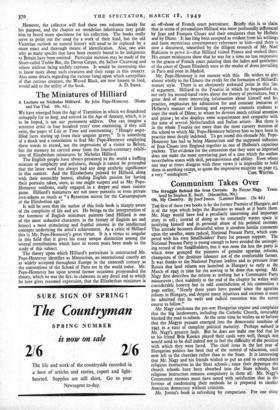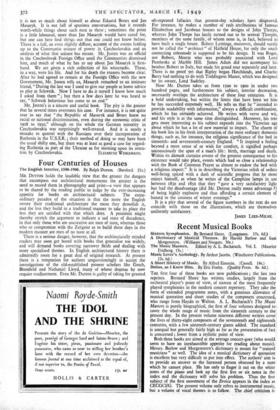Communism Takes Over
The Struggle Behind the Iron Curtain. By Ferenc Nagy. Trans- lated by Stephen K. Swift. (Macmillan, 30s.) Oh, My Country. By Josef Josten. (Latimer House. 12s. 6d.) THE first of these two books is by the former Premier of Hungary, and is of the type which helps the Russians as much as it hurts them. Mr. Nagy would have had a peculiarly interesting and important
story to tell ; instead of doing so he constantly wastes space in justifying himself and in personal abuse of his political enemies. This attitude becomes distasteful when it involves hostile comments upon the smaller, more radical, National Peasant Party, which com- peted with his own Smallholders' Party for peasant support. The National Peasant Party is young enough to have avoided the uninspir- ing record of the Smallholders, but it was none the less the party in which were grouped the pioneers of genuine agrarian reforms, champions of the destitute labourer not of the comfortable farmer. It was thanks to the National Peasant leaders and to pressure from Russia that land reform was launched in Hungary so early as the March of 1945 in time for the sowing to be done that spring. Mr. Nagy first describes the reform as nothing but a Communist Party manoeuvre ; then suddenly at the end of the chapter he writes with considerable honesty but in odd contradiction of his contention a page earlier, "Nearly three years have passed since the agrarian reform in Hungary, and despite many injustices and excesses it must be admitted that its swift and radical execution was the surest course to follow."
Mr. Nagy condemns the pre-war Hungarian regime and complains that the big landowners, including the Catholic Church, invariably blocked the road to reform. At the same time he wishes us to believe that the Magyar peasant emerged into the democratic sunshine of 1945 in a state of complete political maturity. Perhaps naiveté is Mr. Nagy's greatest fault. But he does not make one feel that he
or his friend Bela Kovacs played their cards very well, though one would need to be dull indeed not to feel the difficulty of the position with which they were faced. The chief issue in the last year of Hungarian politics has been that of the control of education, until now left to the churches rather than to the State. It is interesting that Mr. Nagy and his friends wished to put an end to compulsory religious instruction in the State schools ; since their departure the church schools have been absorbed into the State schools, but religious instruction remains compulsory in them alL Mr. Nagy's Communist enemies must have noted with satisfaction that in the fervour of condemning their methods he is prepared to idealise American democracy without criticism.
Mr. Josten's book is refreshing by comparison. For one thing it is not so much about himself as about Eduard Benes and Jan Masaryk. It is not full of spurious conversations, but it records worth-while things about such men as these ; sometimes the point is a little laboured, more than Jan Masaryk would have cared for, but one can here find things .,out that one could not know before. There is a full, an even slightly diffuse, account of the events leading up to the Communist seizure of power in Czechoslovakia and an analysis of what that seizure has meant. Mr. Josten was an official in the Czechoslovak Foreign Office until the COMMunists dismissed him, and much of what he has to say about Jan-*Masaryk is first- hand. We are given a rich collection of his wisecracks. These, in a way, were his life. And for his death the reasons become clear. After he had agreed to remain at the Foreign Office with the new Government, Mr. Josten tells us, Masaryk remarked to an intimate friend, "During the last war I used to give our people at home advice to play at Schweik. Now I have to do it myself I know how much I asked from them " ; but then a few days later he was heard to say, " Schweik behaviour has come to an end."
Mr. Josten's is a sincere and useful book. The pity is the greater that he several times overstates his case. For instance, it is not quite true to say that " the Republic of Masaryk and ienes knew no racial or national discrimination, even during the, economic crisis of 1928 to 193o," although on the whole the German minority in Czechoslovakia was surprisingly well-treated. And it is surely a Mistake to quarrel with the Russians over their incorporation of Ruthenia in the U.S.S.R.;their method of doing so may haVe been the usual shifty one, but ;item was at least as good a case for regard-. ing Ruthenia as part of the Ukraine as for insisting upon its reten-







































 Previous page
Previous page